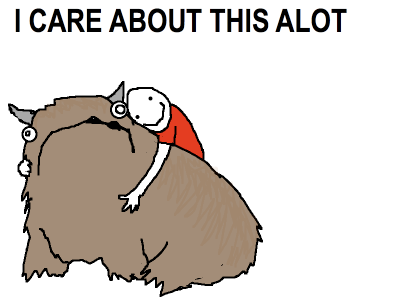Ultimate word rage
[Hat tip to Steve Fitzpatrick]
Stan Carey at Sentence First links to an unusually campy usage fight between The Awl and The Paris Review, and offers a thorough survey of snuckological scholarship. Read, as they say, the whole thing.
Several readers have drawn my attention to the domain and web site "loginisnotaverb.com", and the on-going discussion of this question at Hacker News.
I don't really have much to add to all the fuss. The origin of "log in" as an idiomatic combination of a verb and an intransitive preposition is obvious. There's nothing unusual in the transformation of this V+P combination into a noun, or in the tendency to write the noun (and sometimes the verb) without an internal space. The list of analogous cases is a long one: "strike out", "show off", "make up" — or "strike-out", "show-off", "make-up" — or "strikeout", "showoff", "makeup". Etc. Nothing to see here, move along please.
Read the rest of this entry »
 Over at You Don't Say, John McIntyre has been attending to the Queen's English Society (and other "people who set themselves up as morally superior to you"): "Minutes of the Academy"; "A nice mess"; "The self-righteous shall inherit the earth"; "Speak proper, or else". John links to Stan Carey's post at Sentence First, "The Queen's English Society deplores your impurities".
Over at You Don't Say, John McIntyre has been attending to the Queen's English Society (and other "people who set themselves up as morally superior to you"): "Minutes of the Academy"; "A nice mess"; "The self-righteous shall inherit the earth"; "Speak proper, or else". John links to Stan Carey's post at Sentence First, "The Queen's English Society deplores your impurities".
John and Stan — and Graham and Dogberry and Paul — were stimulated by two articles at The Times (of London), "Pedants’ revolt aims to protect English from spell of txt spk", 6/7/2010, and "Do we need an Academy of English? The experts argue for and against", 6/7/2010.
If you follow all those links — and I hope that you do, because every one of them is worth the trouble — you'll learn that the QES is even more illogical, hypocritical and badly informed than you'd expect them to be. I'll just add three (at best semi-coherent) thoughts, which I'd develop into LL posts if I had the time.
Read the rest of this entry »
Via David Mitchell's soap box, an excellent explanation, with inhabitable graphics, of why "could care less" seems illogical to those who haven't accepted it as an idiom:
Read the rest of this entry »
The latest PhD comic:
As John McIntyre explains, "You've got to be carefully taught", citing Stan Carey's "Mind your peeves and cures".
In case anyone fails to notice what W. Kiernan has pointed out in the comments following this post, we now know that Jan Dawson was wrong about the intended meaning of the phrase practitioner of diversity in the quote from law professor Pamela Harris, and I was wrong (and others including Barbara Partee were wrong) to agree with her interpretation. Briefly, the people who read of diversity as a complement of the noun practitioner were right, and the people like Jan and me who interpreted it as a modifier were wrong — not about the grammatical possibilities, but about the writer's intent in this particular case.
Read the rest of this entry »
Language Log reader Jan Dawson saw the preposition phrase of diversity in this passage, and knew immediately what it meant:
"Any practitioner of diversity will tell you that you can't bring in a few token people and get a real diversity of viewpoint," said Pamela Harris, the executive director of the Supreme Court Institute at the Georgetown Law Center. (http://www.nytimes.com/2010/05/11/us/politics/11women.html)
It seemed fairly clear to Jan (and I think she's right) that of diversity here means something like "belonging to one of the formerly excluded groups associated with references to diversity such as women, Hispanics, African Americans, etc." — it's analogous to the common meaning of the phrase of color in phrases like person of color.
Read the rest of this entry »
According to John Metcalfe, "The Self-appointed Twitter Scolds", NYT 4/29/2010:
A small but vocal subculture has emerged on of grammar and taste vigilantes who spend their time policing other people’s tweets — celebrities and nobodies alike. These are people who build their own algorithms to sniff out Twitter messages that are distasteful to them — tweets with typos or flawed grammar, or written in ALLCAPS — and then send scolding notes to the offenders. They see themselves as the guardians of an emerging behavior code: Twetiquette.
Read the rest of this entry »
Allie Brosh, over at Hyperbole and a Half, is annoyed by people who leave out the space in "a lot" ("The Alot is Better Than You at Everything", 4/13/2010):

Read the rest of this entry »
A few days ago at the Guardian, David Marsh brought out the stuffed body of George Orwell and propped it up in the pulpit ("Election 2010 – vote for the cliche you hate the most", 4/9/2010):
George Orwell, in his brilliant 1946 essay Politics and the English Language, wrote: "When one watches some tired [political] hack on the platform mechanically repeating the familiar phrases … one often has a curious feeling that one is not watching a live human being but some kind of dummy." He memorably argued that "if thought corrupts language, language can often corrupt thought" and proposed six rules of good writing:
• Never use a metaphor, simile or other figure of speech which you are used to seeing in print.
• Never use a long word where a short one will do.
• If it is possible to cut a word out, always cut it out.
• Never use the passive where you can use the active.
• Never use a foreign phrase, a scientific word, or a jargon word if you can think of an everyday English equivalent.
• Break any of these rules sooner than say anything outright barbarous.
The result was shocking.
Read the rest of this entry »
Four years ago I wrote a Language Log post looking into the use of podium as a verb at the Winter Olympics in Torino — and the often extreme reactions that the usage provoked. Now with the Vancouver Olympics coming up, I return to the theme in my latest On Language column in the New York Times Magazine. It is no doubt the first (and last) article in the Times to cite both a senior editor of Ski Racing magazine and Eve & Herbert Clark's crucial study of denominal verbs.